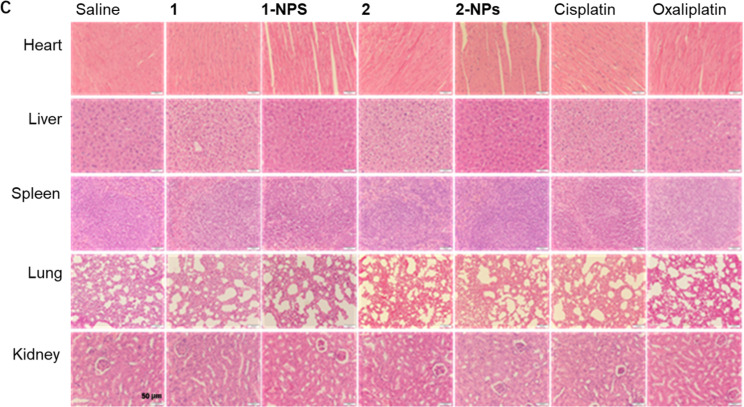Li L, Chen Y, Wang Q, et al. Int J Nanomedicine. 2021;16:5513–5529.
It has been brought to the authors attention that the control groups of antitumor activities in vivo overlapped with those from the authors previously published article, Chen Y, Wang Q, Li Z, et al. Dalton Trans. 2020;49:5192–5204 (https://doi.org/10.1039/D0DT00424C) which was cited as reference 39. These two works both belonged to the topic of platinum(IV) antitumor complexes with inflammation inhibitory competence, but focused on two important and different aspects. Dalton Trans. 2020;49:5192–5204 (Ref 39) reported the free naproxen platinum(IV) hybrids as potent antitumor compounds. To further improve antitumor activities and decrease toxicities of naproxen platinum(IV) complexes, albumin-encapsulated nanoparticles based on naproxen platinum(IV) complexes were prepared and investigated in this work. In order to compare the antitumor activities of the albumin-encapsulated nanoparticles and free naproxen platinum(IV) complexes more clearly, the experiments of the antitumor activities in vivo in both works were carried out simultaneously, and the same positive and negative control groups (cisplatin, oxaliplatin, blank) were shared.
The authors wish to cite and declare in the associated Figures 4, 5 and 10 the following, “Reprinted with permission from Chen et al. Dalton Trans. 2020;49(16):5192–5204. Copyright © 2020. The Royal Society of Chemistry.39”
In addition, the authors regret that an error occurred during the preparation of Figure 5C. Incorrect images for the H&E staining slices of Heart, Saline group and Liver, Compound 1 treated group were used, following an accidental mix-up of the data during the image compilation, and the correct images were reuploaded. The authors sincerely apologize for the error and guarantee that this correction has no impact to the interpretation of the presented results and conclusions of this work.
The correct note section for Figure 4 on page 5522 is as follows.
Notes: Results are presented as the mean ± SD (n=6). *P<0.05, **P<0.01, ***P<0.001, ****P<0.0001. (C) Reprinted with permission from Chen et al. Dalton Trans. 2020;49(16):5192–5204. Copyright © 2020. The Royal Society of Chemistry.39
The correct Figure 5 and note section on page 5523 is as follows.
Figure 5.
Continued.
Figure 5.
In vivo toxicities of tested compounds and nanoparticles to BALB/c mice. (A) The body weight of the mice during the treatment. (B) Drug accumulation in liver and kidney. (C) The H&E staining of slices from heart, liver, spleen, lung and kidney.
Notes: **P<0.01, ***P<0.001. (C) Reprinted with permission from Chen et al. Dalton Trans. 2020;49(16):5192–5204. Copyright © 2020. The Royal Society of Chemistry.39
Abbreviations: NPs, nanoparticles; H&E, hematoxylin and eosin.
The correct note section for Figure 10 on page 5527 is as follows.
Notes: Results are presented as the mean ± SD (n=5). *P<0.05, **P<0.01, ns, no significant difference. (A) Reprinted with permission from Chen et al. Dalton Trans. 2020;49(16):5192–5204. Copyright © 2020. The Royal Society of Chemistry.39




